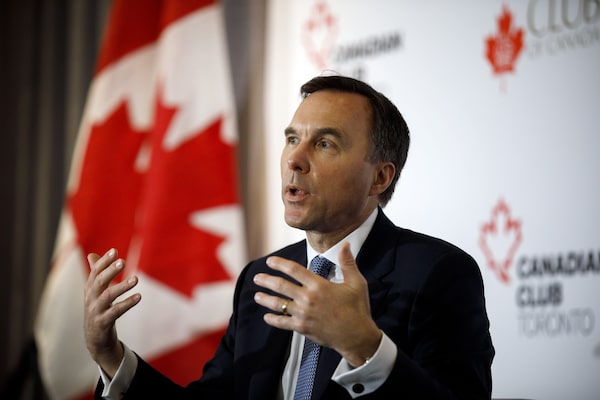
Finance Minister Bill Morneau speaks during an armchair discussion co-hosted by the Toronto Region Board of Trade, The Empire Club and Canadian Club of Toronto on March 20, 2019.Cole Burston/The Canadian Press
Finance Minister Bill Morneau suggested that regulatory issues are Canada’s next priority in tackling its business competitiveness problems, while defending his government’s record on corporate taxes.
Addressing a business audience in Toronto the morning after unveiling a new budget that contained no significant new tax relief for the corporate sector, Mr. Morneau said Canada’s overall rates “are in a competitive zone” with the United States, while small-business taxes “are lower than any other country in the G7.” He added that the government already moved last fall to accelerate tax deduction of business capital investments, which “ensures that we’re more than competitive with the United States.”
“From a regulatory standpoint, though, there’s absolutely more to do,” he said.
Many business leaders have urged the government to pursue broader tax reforms with an eye on improving Canada’s competitiveness, particularly in light of the sweeping corporate tax changes put in place in the United States last year, which, among other things, eliminated Canada’s corporate tax rate advantage. But after the government introduced measures in its fall fiscal update to ease some key tax-related issues – most significantly the capital-cost deductions – it now looks to be turning its attention to the regulatory side.
“Disappointingly, the government has again ignored calls for a long-term, in-depth review of the tax system. There was also little near-term relief for businesses," Toronto-Dominion Bank economists Beata Caranci and Brian DePratto said in a research note.
The budget said the government will establish shortly an External Advisory Committee on Regulatory Competitiveness – a body of business leaders, academics and consumer representatives that will advise the government on “opportunities to streamline regulations and for novel regulatory approaches.”
“We don’t want to have regulations that don’t make sense,” Mr. Morneau said.
He pointed specifically at the energy pipeline issue as a prime example of regulatory barriers hampering the country’s global competitiveness.
“The biggest thing I hear as I go around the country on the regulatory front, is obviously getting big projects built,” he said. “We cannot get a pipeline built to get our resources to international markets.
“There is a big and legitimate concern,” he said.
On the Trans Mountain pipeline, which the federal government purchased last year from private interests amid persistent regulatory complications, Mr. Morneau said the government is making progress in consultations aimed at clearing those regulatory hurdles and getting construction started.
“We want to get this done, but we need to get it done in the right way – so that we actually have a demonstrated approach to getting a project like that done.”
He also suggested that the provinces have work to do to reduce interprovincial regulatory barriers.
“There are important things that have developed over time that we need to break down,” he said.
The federal budget includes new spending in a range of areas including support for first-time homebuyers, ensuring seniors are enrolled in CPP and the further advancement of reconciliation.
Speaking with reporters after his address, Mr. Morneau defended the government’s continued budget deficits, including its estimated $19.8-billion shortfall in the coming 2019-20 fiscal year, after having promised when elected in 2015 that it would bring the budget into balance by 2019. The government has instead focused on slowly reducing its deficits and debt relative to gross domestic product.
However, he did leave the door open to moving into balance down the road – while stressing that achieving it isn’t the government’s top concern.
“We will continue to work toward getting to a balance situation,” he said. “First and foremost, though, we want to make sure that we make the investments that give people the optimism for the future. That is our priority.”
In a public campaign-style speech to the caucus of Conservative MPs Wednesday morning, Conservative Leader Andrew Scheer dismissed the budget as a political effort by Prime Minister Justin Trudeau to distract the public’s attention from the SNC-Lavalin controversy.
“His plan could not be more obvious,” he said. “Massive deficits to distract from his corruption before the election, and massive tax hikes to pay for it all after the election. Canadians will quite literally pay for his corruption unless, ladies and gentlemen, we stop them from doing it.”
Mr. Scheer noted that Mr. Trudeau made a clear promise to voters in the previous campaign that he would balance the budget in 2019.
“Well, guess what? It’s 2019. Turns out budgets don’t balance themselves,” he said. “I will run the budget the way you run your household: We will live within our means, leave more money in your pocket and help you get ahead.”
 David Parkinson
David Parkinson Bill Curry
Bill Curry